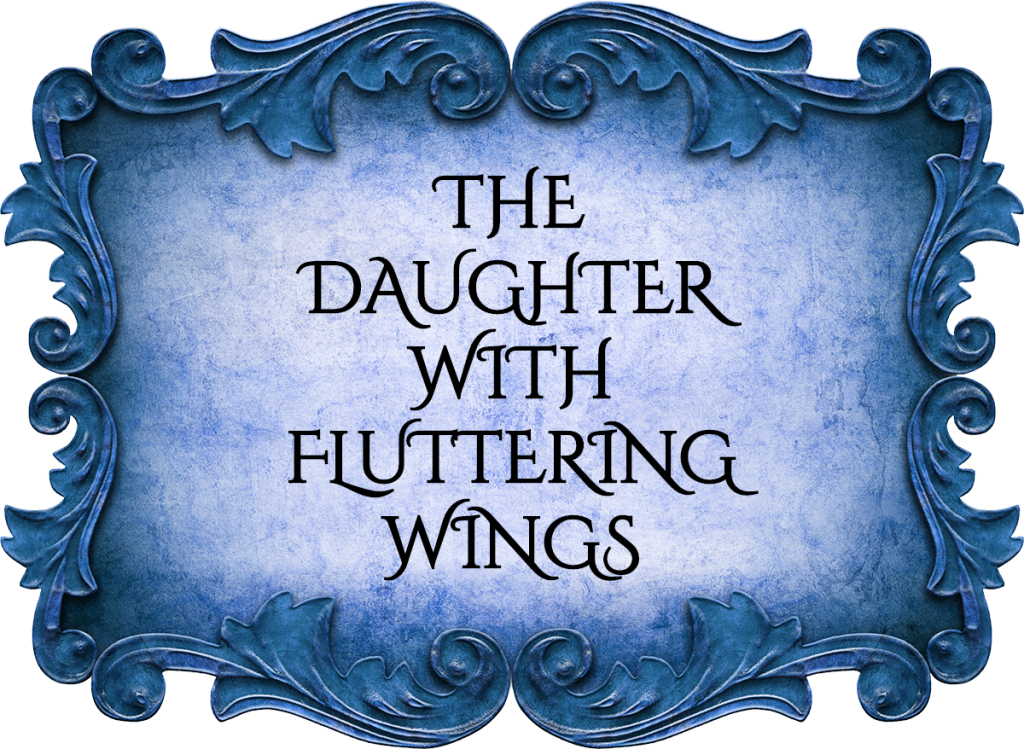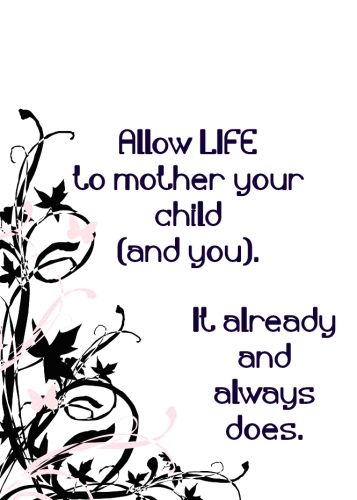-
The Daughter with Fluttering Wings, a fairy tale for enlightenment
-
The Seaweed on the Pillow, a fairy tale for enlightenment
-
The New Bride Who Was Frightened, a fairy tale for enlightenment
The men are away from home to fight a holy war, a thing which exists not. The women wait and hope and gather together to bake flat cakes on hot hearthstones. Tonight there shall be meat pie! Yet more is needed for hearts so in fear. Come, gather round the crone. She is ready to tell her tiny tale, so open you mind and heart and find what meaning you will.


Nuns found a new bride weeping outside their abbey.
They brought her to the prioress, who was busy whispering spells in the cloister round a garden of trees laden with plum, quince, and bitter orange.
“She is scorned and thrown away,” the nuns explained. “We must needs pray to St. Wilgefortis, our patron who cares for women with bad husbands!”
The prioress was familiar with such a need. For men in these dark days did blame women for any matter of evil, imagined or not. She nodded and sent the nuns to contemplate in the nave whatever they wished, and eyed the new bride. “Why do you weep?” she inquired.
“I am so frightened,” the new bride answered in trembling voice.
 “My husband accused me of despoiling tombs so that a throng did try to stone me. This morn he returned me to my childhood home. My father cursed me, saying the truth must be I made a cuckold of my husband. I am all alone in the world, a terrible place! What good can come to me now?”
“My husband accused me of despoiling tombs so that a throng did try to stone me. This morn he returned me to my childhood home. My father cursed me, saying the truth must be I made a cuckold of my husband. I am all alone in the world, a terrible place! What good can come to me now?”“I wonder indeed. Walk with me.”
The new bride sobbed as she strolled beneath beautiful stone arches swaying atop columns of thorned roses. “Oh, what good can come to me now?” she wailed over and again. After a time, she became hungry and noticed within the garden the many fruit trees. “Are those plums?” she asked, sniffling. She wondered had the nuns baked on this day a fine plum pie.
“Not yet ripe. But wait.” The prioress waved her hand, and the fruit grew plump and heavy. “There now. My daughter, did you notice where on the trees the fruit grows?”
“All over,” the new bride said as she plucked a plum and bit deep. Juice dribbled down her chin.
The prioress moved to stand beside a tree, her wimple grazing its leaves. She gazed at the plums with serious face. “Nay. Fruit does not grow on the wide trunk of the tree, nor even where the tree divides into thick branches. Do you see? The fruit is found hanging on thin limbs. Why do you suppose this is?”
“I do not know, Prioress.”
“You speak a good answer,” the prioress praised. “For we do not understand why things are as they are, but surely, fruit loves to grow where the tree is most fragile.”
With this, the prioress lifted the new bride’s chin with an age-spotted finger. “And so shall you bear fruit where you are most fragile. Have faith and do not despair. Be bright and alert. For good can come to you most especially now.”
This is a citrusy take on the saying, “It’s darkest before the dawn.”
For whatever reason, it’s true that when we’re broken, the light gets in so much easier. Remember that even when you’re afraid of the dark, your soul is not. So, be bright and alert and brave when you experience a dark night, for that is when your soul most often bears fruit in this world.
And that is EXACTLY how heaven comes to earth.
-
The Spirit of Christmas Eve, a fairy tale for enlightenment
Silver bells ring eerie on this cold Christmas Eve. Come inside, for ghosts of long ago roam and bring warning with fright. ‘Tis better to gather round the crone as she tells her Christmas story—the year is short, so open your hearts and minds and find meaning, lest a fearsome spirit visit you this night!

A Yeoman’s Daughter hatched a plan one dark Christmas Eve.
For she did love the manor lord’s son, but he would be forced to marry on Christmas Day the daughter of a most noble knight. Our Yeoman’s Daughter’s love was thwarted as she was deemed less suitable for such a match.
She could not bear to watch her beloved marry another.
Thus, she knelt in church before the priest to give confession. “Forgive me father, for I have sinned. For when I found in the stables the Knight’s Daughter in fornication with a peasant man of handsome face, I agreed to lie for her. It weighs on me most heavy.”
The priest, a favored adviser to the manor lord, gasped. “The temptress!” he said. Laying a hand on the head of the Yeoman’s Daughter, he forgave and in haste blessed her. Our Yeoman’s Daughter gathered shawl about her shoulders and watched as the priest hurried down the cobbled road to whisper in the manor lord’s ear.
A snow began to fall, and she stood motionless on this beautiful and holy night, frightened by what she had done. Yet what choice did she have? She could have no life without a husband.
A great wind blew of a sudden, banging church shutters. The gentle snow turned quick into a fearsome blizzard. With a cry, our Yeoman’s Daughter did shield her face with a bent arm. She called for help, for all the world had vanished in a swirl of driving snow and black shadows. How cold it was! The air was like frozen water in her lungs, and she squatted there in the church yard, reaching up her arms for help.
Alas, no one came to her. She heard the townspeople talking gaily to one another of eel pie and fruit pottage, and singing their Christmas songs as if no blizzard had set upon the town.
“Help me, please!” she shrieked. Terror seized her heart that she might be lost in the icy maelstrom, for tales of such were known to turn tragic. Her thin shawl and worn tunic could not withstand such cold. Standing, she stumbled this direction and that, but she could see no one, not the church, nor anything at all, until—
A hooded and looming figure appeared dark against the swirling snow. This frightened our Yeoman’s Daughter, who supposed Death had come to stalk her. She bolted and screamed for God to help her, but fell to crack her skull upon the frozen road. Whimpering, she peered up through frozen eyelashes to behold a glowing lantern hanging from the voluminous sleeve of the hooded figure.
“Surely, Death carries no lantern,” she cried in hope. Wavering to her knees, she clutched at heavy robes. “You must be sent by God to save me! Tell me your name, that I might give thanks for you.”
No answer came, and our Yeoman’s Daughter could not see within the dark hood. She trembled. This was all wrong. “Will you not speak to me?” she begged. No answer came. “Very well! At least do God’s bidding and save me!”
No sooner had the words passed her lips than the lantern glowed bright to turn the night to day, chasing away the blizzard. Before our Yeoman’s Daughter’s eyes a hearth appeared, with the Knight’s Daughter holding a small child in her arms as her husband, the manor lord’s son, stoked a merry fire.
The hooded figure spoke at last. “Never to come, never to come.”
The lantern flashed even brighter than before, and a new scene did appear out of the blizzard. The Knight’s Daughter stood before a gilded mirror, arranging cloth to hide a bruised face. She wept, asking her maid why the manor lord’s son no longer wished her to bear his children, and why her father had beaten her for what she had never done.
“Oh,” said our Yeoman’s Daughter and tried to turn away. “I…I do not wish to see her. Please. I cannot.”
But the hooded figure reached out and grabbed fast to our Yeoman’s Daughter, and to the Knight’s Daughter as well, reaching across time. The two women stood face to face and a curious thing did happen. They could not look away. In a time between a thousand Christmases and its Eve, they gazed into one another’s eyes. And it was as if looking into a mirror, for the two souls were one. What happened to one happened to the other. What one did the other had done. This they had never known.
“We are the same!” they said, both nearly fainting in surprise.
The hooded figure pushed back her hood and raised her lantern. It grew its brightest yet. A new vision did appear: a tree, heavy with ripe fruit in a garden where women did rightly dwell, no matter the stories of ancient men. Our Yeoman’s Daughter took the hand of the Knight’s Daughter. Alongside the Spirit of Eve on this and all nights before Christmas, they ate the sweetest apples, for nothing was forbidden.








